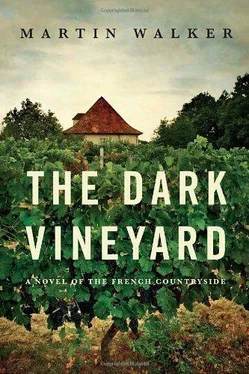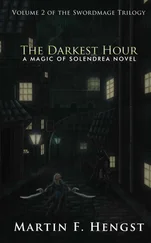Martin Walker - The dark vineyard
Здесь есть возможность читать онлайн «Martin Walker - The dark vineyard» весь текст электронной книги совершенно бесплатно (целиком полную версию без сокращений). В некоторых случаях можно слушать аудио, скачать через торрент в формате fb2 и присутствует краткое содержание. Жанр: Полицейский детектив, на английском языке. Описание произведения, (предисловие) а так же отзывы посетителей доступны на портале библиотеки ЛибКат.
- Название:The dark vineyard
- Автор:
- Жанр:
- Год:неизвестен
- ISBN:нет данных
- Рейтинг книги:5 / 5. Голосов: 1
-
Избранное:Добавить в избранное
- Отзывы:
-
Ваша оценка:
- 100
- 1
- 2
- 3
- 4
- 5
The dark vineyard: краткое содержание, описание и аннотация
Предлагаем к чтению аннотацию, описание, краткое содержание или предисловие (зависит от того, что написал сам автор книги «The dark vineyard»). Если вы не нашли необходимую информацию о книге — напишите в комментариях, мы постараемся отыскать её.
The dark vineyard — читать онлайн бесплатно полную книгу (весь текст) целиком
Ниже представлен текст книги, разбитый по страницам. Система сохранения места последней прочитанной страницы, позволяет с удобством читать онлайн бесплатно книгу «The dark vineyard», без необходимости каждый раз заново искать на чём Вы остановились. Поставьте закладку, и сможете в любой момент перейти на страницу, на которой закончили чтение.
Интервал:
Закладка:
“We wanted to have his ashes scattered here tonight, when everyone was with us, but they won’t release the body,” said Celine. “I don’t understand why not. You must know, Bruno. What is it?”
“I think there’s some concern about whether Max or Cresseil died first because that will affect the inheritance,” said Bruno. He changed the subject. “What time do you light the fire?”
“Any time now, when it’s really dusk,” said Alphonse. “But first I think I should dance with Jacqueline, the last woman who held our dear boy and made him happy.” He took her hand, turned to take a long puff from Celine’s joint and led Jacqueline away.
“I’m glad you didn’t notice that,” Pamela teased. “It would be awful to ruin the evening by arresting the host.”
“Live and let live,” said Bruno. “Would you like to dance?”
They strolled through the throng, pausing to greet new arrivals, dodging goats and children, and arrived at the terrace that had become a dance floor to see all the dancers standing in a ring and grinning as Alphonse performed one of his extraordinary dances to Jefferson Airplane’s “White Rabbit.” Jacqueline looked bewildered as she tried to keep in step as Alphonse bounced happily around her, his elbows jerking out from side to side, his fingers snapping and his head rocking as he belted out the words of the song.
“Did people used to dance like that?” asked Pamela.
“They must have,” said Bruno. “Look at the new arrivals.”
Celine now had taken the floor, twirling around with her arms outstretched, her green robe billowing like a mainsail as the smoke from her joint drifted into the air. Another of the commune originals, a tall and gaunt man, completely bald and wearing a suit of black velvet, joined her and began to sway. An even older couple with white hair stepped onto the floor and began to jive.
“I’m not sure I can do any of those dances,” said Pamela. “But let’s try.”
The last echoes of “feed your head” were fading, to be replaced by Eric Clapton’s “Layla” as Bruno and Pamela stepped forward. Bruno encouraged others in the surrounding crowd to join them, and soon it seemed everyone was dancing, including the mayor and Xavier and Rene and Gilbert from the bar with their wives. The mayor cut in on Bruno, took Pamela in his arms and began what looked like a slow foxtrot, leaving Bruno to join Jacqueline just a moment before half the rugby team descended on her.
“Alphonse said he had to light the fire,” she said. “Isn’t he bizarre? You wonder how Max grew up so normal in a place like this.”
The music faded, and the boom of a great gong sounded. People turned to see Alphonse standing by the bonfire, holding up a large brass disk and beating it again so that the sound echoed back and forth across the hollow. Even the goats stopped their chewing and stared. Celine walked down to stand beside him. Alphonse laid down the gong and picked up a large stick, its tip black and sticky with oil.
“Friends and family, we are all here because of Max, and in this commune we do not grieve the passing, we celebrate the life. So we dance and sing and feast in his honor. I raised Max and I loved him. His memory will always be with me, as it will be with you, and I’m grateful for the warmth he brought to all our lives. Now I’d like all the family of our commune to come down here and join me.”
They came to stand with Alphonse and Celine as the darkness gathered and Alphonse lit his torch. Celine bent to the floor by the bonfire and began to distribute a sheaf of similar torches. The commune members all held them against Alphonse’s flame until half a dozen were flaring against the darkening sky, casting red glows that flickered over their faces as the heady scent of roasting meat drifted across the crowd. It felt pagan but somehow deeply familiar to Bruno, as though this was how all celebrations and events must have been in the past, centuries of roasted lambs and fires and wine, before the age of electricity, when there was only fire to light the darkness.
Alphonse and Celine thrust their torches into the base of the bonfire, and then one after the other the rest of the commune members followed suit. Hesitantly at first but then with growing vigor the fire began to rise up the tall sticks, delicate blue flickerings at first and then yellow flares and finally thrusting, eager red flames four meters high that towered above Alphonse and his friends, who stepped steadily farther and farther back from the surging heat.
“Farewell, Max,” called Alphonse, then he turned to embrace Celine, and then all the children and the former members of his commune, and led them back to the wine and the roasting lambs and the throng of friends, all lit by the raging fire.
Stephane and Raoul were the carvers, neatly severing the heads and legs by the light of oil lamps and the distant bonfire, before slicing the meat into hearty portions. Alphonse was brandishing a massive ladle, serving couscous from a giant cauldron, and Bruno had been recruited to help Xavier open the massed ranks of wine bottles the guests had brought. Pamela was at the next table, tossing vast bowls of salad with olive oil and the commune’s own wine vinegar. Fabiola was bandaging the skinned knee of a weeping small boy who had tripped over one of the young goats, and Jacqueline was still dancing.
When the crowds were all served, and Bruno and Pamela and the other servers began to feed themselves, the few available chairs were all taken. Bruno tucked a bottle of wine under each arm, his plate in one hand and a stack of plastic glasses in the other, and joined Dominique and Stephane, who were sitting on the grass. Pamela brought her plate atop a large bowl of salad, one of Alphonse’s loaves under one arm and a roll of paper towels under the other. Alphonse had turned down the volume so the Beatles’ White Album was a distant backdrop.
“I feel like I’m back in the Middle Ages,” said Pamela, giving up on the feeble plastic fork and starting to eat with her fingers. Bruno handed her his knife, knowing it would make little difference. He had been to so many such events that he came prepared, and now he reached into a side pocket of his cargo pants and brought out a fistful of foil packets emblazoned with a lobster, each containing a moistened towel.
“I never go to a picnic without them,” he said. “The Middle Ages might have been different if they’d had them. But I know what you mean, feeling that this is how it must have been for our ancestors. Maybe that’s why we enjoy it.”
Looking out over Alphonse’s strange property, he saw Fabiola and Jacqueline squeezed onto benches at the same table with the rugby team, laughing and chatting. The mayor was at a table with Alphonse and Celine and some of the original commune members.
“You’re like a mother hen.” Pamela grinned. “Don’t worry, all your chicks are happily taken care of and enjoying themselves. The guardian of Saint-Denis can relax for once.”
“I was just a bit worried about Fabiola, but she seems to be fitting in fine and meeting people.”
“She’s a pretty girl, despite that scar, and since she doesn’t pay much attention to it, other people don’t get embarrassed and after a while you forget about it. It’s like having red hair. I hated it when I was a girl and thought everybody was looking at me all the time, but then you realize they aren’t, and if they are it doesn’t matter.”
“Really?” Bruno asked. “I thought your hair must always have been that glorious auburn-bronze color.”
“It was brighter when I was little. Carrottop, they called me, and sometimes Ginger. I had an uncle who used to pretend to light his cigarette from it.”
“They used to call me ‘dwarf’ and ‘shorty’ and other names because I didn’t really grow until I was fifteen,” said Dominique. “Except Max. He never called me names and never let other people do it, not when he was around.”
Читать дальшеИнтервал:
Закладка:
Похожие книги на «The dark vineyard»
Представляем Вашему вниманию похожие книги на «The dark vineyard» списком для выбора. Мы отобрали схожую по названию и смыслу литературу в надежде предоставить читателям больше вариантов отыскать новые, интересные, ещё непрочитанные произведения.
Обсуждение, отзывы о книге «The dark vineyard» и просто собственные мнения читателей. Оставьте ваши комментарии, напишите, что Вы думаете о произведении, его смысле или главных героях. Укажите что конкретно понравилось, а что нет, и почему Вы так считаете.












